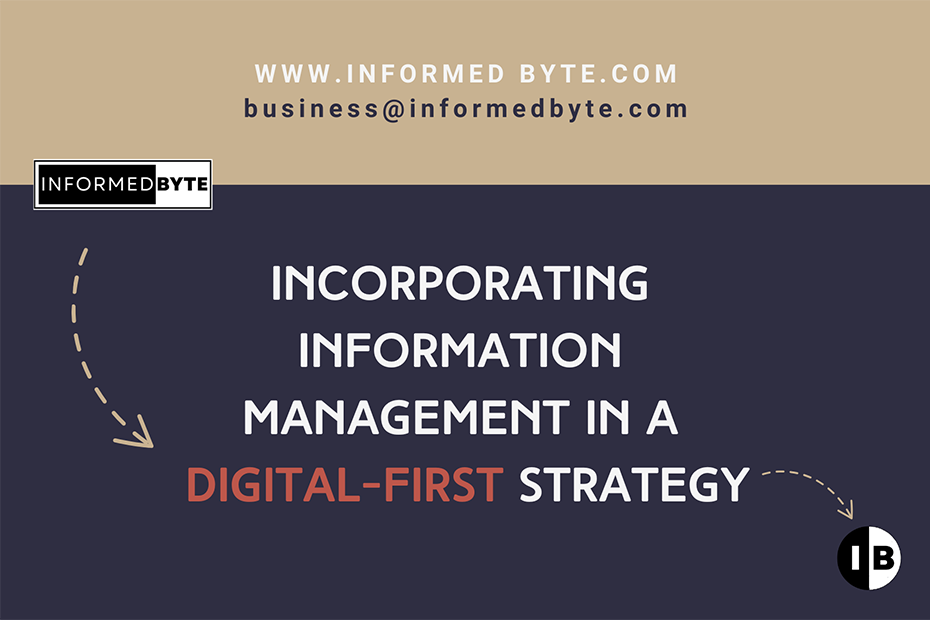Incorporating Information Management in a Digital-First Strategy
October 28, 2024
Your organisational digital-first strategy prioritises digital channels, tools, and processes. The goal of this is to enhance customer experiences, streamline operations, and drive innovation. At the core of this digital transformation is effective information management (IM), which plays a crucial role in ensuring that data is organised, and accessible.

Image credit by JESHOOTS.COM on Unsplash
The importance of information management in a digital-first strategy
1. Data as a strategic asset
Data is often referred to as the new oil, and for good reason, information is power and has been for centuries. Contemporary information is commonly in the form of data. In a digital-first environment, organisations generate vast amounts of data from various sources—customer interactions, market trends, internal processes, and more. Effective information management helps organisations harness this data, transforming it from a byproduct into a strategic asset. By managing data effectively, organisations can extract valuable and sustainable information that enhances customer experiences, and fosters innovation.
2. Enhanced decision-making
A digital-first strategy relies heavily on data-driven decision-making. Information management ensures that relevant data is collected, stored, and analysed systematically. By providing access to accurate and timely information, organisations can make informed decisions that align with their strategic goals. This capability is crucial for interacting and responding to customer needs.
3. Improved customer experiences
In a digital-first world, customers expect seamless and personalised interactions. Information management enables organisations to gather and organise data, allowing bespoke or tailored experiences. By understanding customer preferences and behaviours, businesses can enhance engagement, digital asset sharing and sustainability.
4. Regulatory compliance and risk management
With the increasing emphasis on data privacy and security, effective information management is vital for regulatory compliance. Organisations must adhere to various regulations, such as copyright or General Data Protection Regulation (GDPR), which relies on organisation of data. Implementation of best practice information management framework helps ensure compliance, reduces risks, and protects organisational reputation.
Key components of information management
To effectively integrate information management into a digital-first strategy, organisations should focus on the following key components:
1. Data governance
Data governance refers to the policies, procedures, and standards that dictate how data is managed throughout its lifecycle. A strong data governance framework ensures data quality, consistency, and security. Key elements include:
-
Data Ownership:
Clearly defined roles and responsibilities for data management.
-
Data Quality Standards:
Establishing criteria for data accuracy, completeness, and reliability.
-
Compliance Policies:
Guidelines to ensure adherence to legal, regulatory or organisation requirements.
2. Data architecture
Data architecture outlines how data is collected, stored, integrated, and accessed within the organisation. A well-defined architecture supports scalability and flexibility, allowing organisations to adapt to changing data needs. Components of data architecture include:
-
Data Models:
Schemas that define the structure of data and relationships between data elements.
-
Storage Solutions:
Choosing appropriate storage technologies (e.g., cloud storage, databases) based on organizational requirements.
-
Integration Frameworks:
Mechanisms for connecting disparate data sources and systems.
3. Data management processes
Effective data management processes encompass the methodologies and practices used to collect, store, and utilise data. Key processes include:
-
Data Collection:
Methods for gathering data from various sources, ensuring accuracy and relevance.
-
Data Maintenance:
Regular updates and cleansing of data to maintain quality.
-
Data Security:
Implementing measures to protect data from unauthorised access and breaches.
4. Analytics and insights
Analytics play a critical role in deriving actionable insights from data. Organisations should invest in analytics tools and capabilities that allow them to:
-
Perform Descriptive Analytics:
Understand historical data to identify trends and patterns.
-
Conduct Predictive Analytics:
Use statistical models to forecast future outcomes based on historical data.
-
Enable Prescriptive Analytics:
Provide recommendations for decision-making based on data analysis.
Best practices for integrating information management
To successfully incorporate information management into a digital-first strategy, organisations should adopt the following best practices:
1. Establish a clear strategy
A comprehensive information management strategy should align with the broader digital-first objectives of the organisation. This involves setting clear goals, project milestones or defining key performance indicators (KPIs), and identifying the human and technological resources required for implementation.
2. Foster a data-driven culture
Encouraging a data-driven culture within the organisation is essential for effective information management. Employees should be trained to understand the importance of data and how it translates to information for stakeholders. This cultural shift can lead to better collaboration and innovation.
3. Invest in technology
The right technology is crucial for effective information management. Organisations should assess their existing tools and consider investing in advanced solutions that support data governance, analytics, and FAIR (findability, accessibility, interoperability, and reusability) data practises. This may include data management platforms, business intelligence tools or information dissemination applications.
4. Continuous improvement
Information management is not a one-time effort, it requires ongoing evaluation and improvement. Organisations should regularly assess their information management practices, initiate consulting and gather feedback from stakeholders to make necessary adjustments to enhance effectiveness.
Challenges in implementing information management
While integrating information management into a digital-first strategy offers numerous benefits, common challenges include:
1. Data Silos
Data silos occur when different departments or teams within an organisation store and manage data independently, leading to duplication of information, no single source of truth, fragmentation and inefficiencies. Overcoming this challenge requires a commitment to implementation of new policies, procedures or technologies.
2. Change Management
Implementing new information management practices often involves significant changes to existing processes and workflows. Resistance to change can hinder adoption, making effective change management strategies and training essential for success.
3. Skill Gaps
Organisations may face skill gaps when it comes to data management and analytics. Investing in training and development or continuing professional development (CPD) programs can help employees acquire the necessary skills to leverage information management effectively.
4. Evolving Regulations
The landscape of data privacy and security regulations is constantly evolving. Organisations must stay informed about changes and ensure that their information management practices remain compliant.
Informed Byte is your information management partner
Incorporating information management into a digital-first strategy is essential for organisations seeking to thrive in the digital age. By treating data as a strategic digital asset, enhancing sustainability, improving customer experiences, and ensuring regulatory compliance, organisations can unlock the full potential of their digital initiatives. Through effective governance, architecture, and management processes, businesses can create a robust framework that supports their digital-first objectives. While challenges may arise, adopting best practices and fostering a data-driven culture will empower organisations to navigate the complexities of information management and leverage data for sustained success.
Informed Byte offer information management consulting, systems implementation, training, knowledge sharing, and managed services for information and data needs.
Contact us to enhance your digital-first strategy
